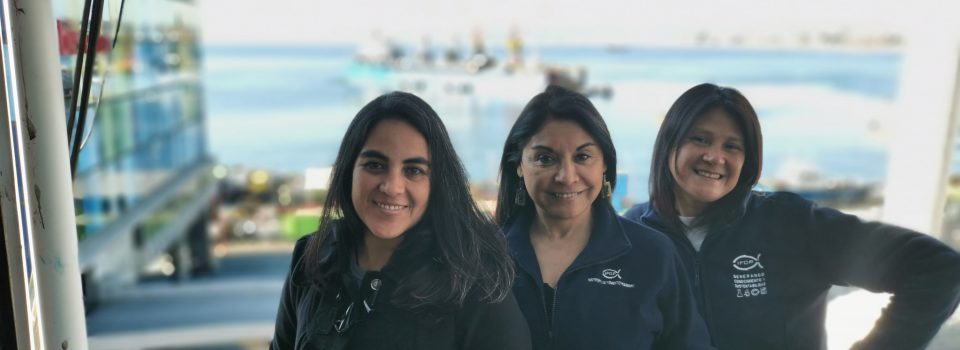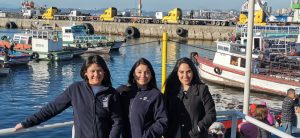“Hidden crops” scope worldwide research is led by Chile
August 5th, 2019This research is intended to support small-scale fisheries development through a socially and environmentally sustainable approach. A key element to technically support this is to “illuminate” various fisheries contributions.
Recently it was a known fact that Chilean Fisheries Development Institute (IFOP) will participate in the global study “Illuminating Hidden Crops” (Illuminating Hidden Harvests, IHH), which is coordinated by the Food and Agriculture Organization of the United Nations ( FAO, for its acronym in English), WorldFish and Duke University (United States) and where different international organizations will be participatig.
To delve into its scope, AQUA spoke with Luis Parot, IFOP’s executive director and also with Elizabeth Palta head of Fisheries Economics Section of the same institute,.
The first to respond was Parot:
Why Chile, and specifically IFOP, were invited to participate in this research?
This research aims to highlight small-scale fishing role , or artisanal fishing, in achieving Sustainable Development Goals (SDGs) in the world. In this second version of IHH study, 56 countries participate, and Chile was selected for the importance of fishing as a source of employment and the importance of fishing in terms of catches in the global and national context. On the other hand, IFOP has led the incorporation of the ecosystemic approach in fisheries research, an approach fully aligned with the spirit of this study, which seeks to show not only the biological and fishery indicators of fisheries, but also those referred to human dimension of those who exercise these fisheries.
What importance do you give to the invitation to participate in this research made to IFOP ?
IFOP is the Chilean reference in fisheries, aquaculture research in oceanography and climatic change, in charge of scientific and technical advice to public institutions, for regulatory and administrative measures.
In the international sphere, IFOP maintains collaboration agreements with prestigious research centers, which allows us to do joint studies, also positioning ourselves as an international reference in these matters.
In that sense, FAO, as anUnited Nations agency , commissioned IFOP for this project , without a doubt, a recognition of the institute’s trajectory and the skills of its researchers, qualified by FAO, as local experts in priority countries .
In the case of Chile, the three researchers that make up the team of this project (know about their experience below), have extensive knowledge of small-scale fisheries and their value chain. Such experience is fundamental in this study, which requires a broadening of the view from fishing itself, to its contributions in the social, economic and environmental fields, including aspects related to population nutrition and governance.
According to you: What impact could this research have in the worlds fishing activity research ad specially in Chile?
The important contribution of fisheries to global human well-being is frequently underestimated, either because existing studies are partial or come from methodologies of different standards, which does not allow a worldwide projection. This report will provide background information that will contribute to a greater understanding of the impact of small-scale fisheries worldwide and locally. Having this knowledge is essential for decision makers and policy makers, as it will allow ex-dimensioning the impact of programs and decisions on the management of small-scale fisheries.
Elizabeth Palta
How and what type of information will be collected for this study purpose ?
The study aims to support small-scale fisheries development through a socially and environmentally sustainable approach. A key element to technically support this is to illuminate these fisheries various contributions. Small-scale fishing provides livelihoods for many people, and contributes substantially to the local and national economy, and to economic growth. However, due to its diverse and dispersed nature, it is difficult to quantify and understand its multiple contributions.
In Chile, the artisanal landing (close to 1.5 million tons per year) is not homogeneous along the more than 6 thousand kilometers of coastline, is composed of about 200 species and provides direct livelihood to more than 100,000 homes , which far exceeds industrial fishing. It is estimated that 20% of women participate in fishing activities, while in the previous and post fishing activities, the participation of women is over 50%. These results are fundamental when it comes to understanding small-scale fisheries contribution to the national economy, and the impact that situations such as climatic change or increased fishing effort can bring.
Why will the IFOP Economics Section, which you lead, actively participate in this research?
This research should collect and submit a set of relevant data on fisheries, demography, employment, fish consumption and nutrition to a synthesis and estimation process. In this context, the experience of the Economics Section in the generation of information on the value chain of the national fisheries and aquaculture industry, of economic and socioeconomic antecedents of the fisheries, alltogether with the team competences in the quantitative and qualitative fields , accredits us extensively to carry out this study.
The project team is composed of researchers Johanna Rojas, Andrea Araya, myself, and sociologist David Miranda, who supports us in the social area.
We hope to be able to provide the most up-to-date and accurate statistics on the contributions and impacts of Chilean artisanal fisheries, in environmental, economic, food security and governance terms at national and global levels.
How long will the research last?
This is a very complex research, of many interesting challenges, with many collaborators, which requires the cooperation and goodwill of many people in 56 countries. It is an unprecedented effort in this area.
Data collection is planned during 2019, but a global report is expected in 2020. The project provides a ‘snapshot’ of the current contributions of small-scale fisheries, but also analyzes change drivers, in order to envision progress in the short and medium term.
Our results will be sent in the coming months to FAO central headquarters in Rome (Italy), who will issue a global report in 2020, in an initiative that integrates methods and results of country case studies, thematic studies and global synthesis of Small-scale fishing in the world.
Experience
Johanna Rojas Rojo, is an execution engineer in aquaculture and an industrial management engineer. Her interest areas: the generation of economic and socioeconomic data on fisheries and aquaculture, and seafood consumption. She currently works as a researcher in the Economics Section of the Fisheries Development Institute , responsible for collecting data on manufacturing and foreign trade of the national fisheries and aquaculture industry.
Andrea Araya Arriagada, is a marine biologist and master in Marine Sciences. Her interest areas are: data analysis, bio-economic modeling and economic valuation in both the fishing and aquaculture area. Currently, she works as a researcher at IFOP Economics Section, responsible for fisheries systematization and analysis of economic and socioeconomic data.
Elizabeth Palta Vega, a fishing engineer, currently works leading the economic team of Fisheries Development,Institute which conducts studies of monitoring economic indicators, value chain, bioeconomic modeling, economic valuation, consumption of seafood and socio-economic diagnoses of artisanal and industrial fisheries and national aquaculture.

